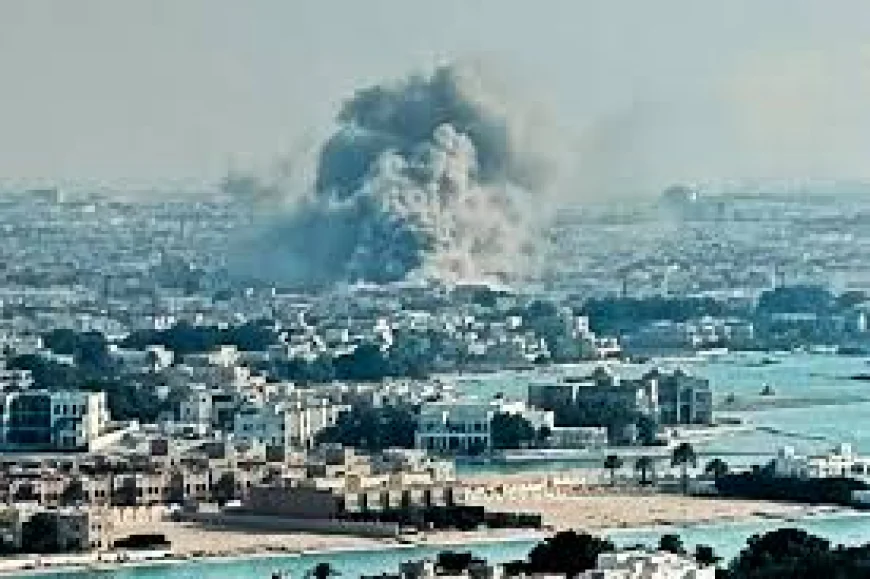Israel Airstrike Hits Hamas Leaders in Qatar Amid Ceasefire Talks
Israel carried out a rare airstrike in Qatar on September 9, 2025, targeting Hamas leaders during ceasefire talks in Doha. Six people, including a Hamas commander’s son and a Qatari security officer, were killed, though senior Hamas figures survived. The strike sparked international outrage, with Qatar, Russia, Turkey, and the EU condemning the attack as a violation of sovereignty. The U.S. distanced itself, while hostages’ families in Israel expressed fears the move could derail prisoner negotiations. The UN Security Council is set to convene an emergency session as diplomatic fallout grows.

Israel’s Strike on Hamas in Qatar Marks a Dangerous Escalation
Doha, Qatar — September 10, 2025.
In a move that stunned the international community, Israel carried out an unprecedented airstrike in Qatar on September 9, targeting senior Hamas officials gathered in Doha to discuss a U.S.-backed ceasefire proposal for Gaza. The attack, which struck the upscale Leqtaifiya district of Doha, killed six people, including the son of a Hamas leader and a Qatari security officer.
The operation, codenamed “Summit of Fire,” involved multiple Israeli fighter jets delivering precision-guided bombs on a residential complex Hamas had used for political meetings. Israel later confirmed its responsibility, with Prime Minister Benjamin Netanyahu declaring the strike “necessary” to protect Israeli citizens from Hamas aggression.
Casualties and Survival of Hamas Leaders
Hamas confirmed the deaths of five of its members, among them Humam al-Hayya, son of senior Gaza leader Khalil al-Hayya, as well as three bodyguards and a director of operations. A Qatari security officer assigned to protect the site was also killed.
Despite the losses, Hamas stated its senior leadership survived, including al-Hayya himself and other key figures. Analysts say their survival may allow Hamas to continue its operations largely intact, though the strike delivers a symbolic blow.
Reactions in Qatar and Abroad
Qatar swiftly condemned the strike as a “cowardly act” and a “flagrant violation of sovereignty,” accusing Israel of endangering its role as mediator in Gaza ceasefire talks. While initially suggesting it might withdraw from mediation, Qatari Prime Minister Mohammed bin Abdulrahman al-Thani later announced that Doha would continue efforts to broker peace, even as he warned that Israel had crossed a red line.
The United States, informed of the strike only hours beforehand, distanced itself from the decision. President Donald Trump called the attack “unfortunate” and said it did not advance “Israel’s or America’s goals.” Washington stressed that while Israel shared notice, the warning was insufficient to allow Qatar or U.S. forces stationed there to prepare.
Other international reactions included:
-
Russia: Condemned the strike as a “gross violation of the UN Charter.”
-
Turkey: Accused Israel of adopting terrorism “as a state policy.”
-
United Kingdom & EU: Expressed grave concern and labeled the attack destabilizing.
-
Saudi Arabia, Egypt, and UAE: Issued strong statements of condemnation, warning it could derail peace diplomacy.
-
Indonesia, Maldives, and Norway: Added to a chorus of criticism, with Norway warning it threatens the fragile Abraham Accords framework.
Meanwhile, families of Israeli hostages voiced fears the strike would jeopardize ongoing negotiations for prisoner releases.
Timeline of Key Events (September 9–10, 2025)
|
Time (UTC) |
Development |
|
9 Sept, ~12:00 |
Israel launches strike in Doha, targeting Hamas leadership compound. |
|
Minutes later |
Qatar Internal Security confirms casualties, disputes U.S. claim of early warning. |
|
Afternoon, 9 Sept |
Hamas confirms deaths of six, but senior leaders survive. |
|
Evening, 9 Sept |
Netanyahu announces Israel acted independently; Trump calls strike “unfortunate.” |
|
Night, 9 Sept |
Qatar condemns strike; speculation arises it may pull out of ceasefire mediation. |
|
10 Sept, Morning |
Russia, Turkey, EU, Saudi Arabia, and others condemn the strike; hostages’ families voice alarm. |
|
10 Sept, Ongoing |
Qatar reaffirms mediation role but warns Israel of consequences; UN Security Council schedules emergency session. |
Strategic Implications
The strike represents a major escalation of the Israel–Hamas conflict, not only militarily but diplomatically. By striking on Qatari soil, a U.S. ally that hosts the Al-Udeid Air Base, Israel risks fracturing ties with key international partners and undermining the credibility of ceasefire talks.
Analysts warn the move could:
-
Undermine Qatar’s long-standing role as mediator.
-
Encourage further regional polarization, with states choosing sides.
-
Signal Israel’s increasing reliance on military options over diplomacy.
Final Thoughts
The Israeli strike on Hamas leaders in Doha is more than a tactical maneuver, it is a strategic gamble that reverberates far beyond the battlefield. While Israel insists the operation was justified, the fallout threatens to unravel fragile peace negotiations, alienate allies, and expand the conflict into new arenas.
As the UN Security Council prepares to deliberate and Qatar weighs its next steps, the question remains: has Israel’s operation brought it closer to security, or has it opened a wider front in an already volatile conflict?
Source:
CNN/Reuters/APNews


